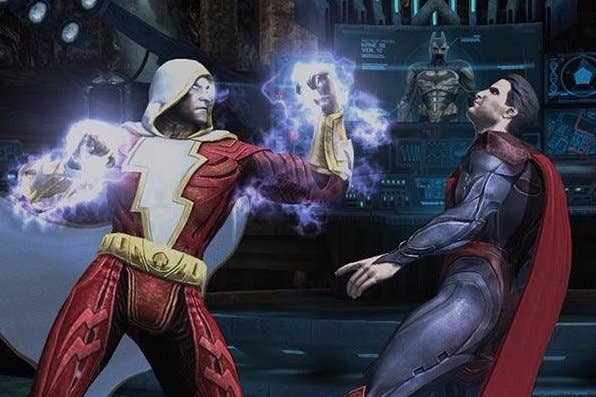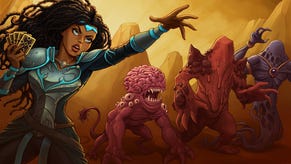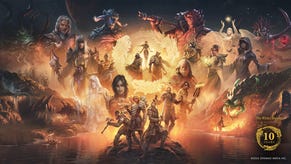Warner Interactive: "Mobile is no longer winner take all"
Greg Ballard on the power of brands to level the playing field, and WBIE's potential to compete with mobile's biggest games
The brands that now dominate mobile gaming did not exist ten years ago. Some them were created within the last five. When companies gaze up at the highest-grossing charts, it can be difficult to conceive of how to replicate the success of an Angry Birds, a Clash of Clans or a Candy Crush. They represent an entirely new scale of success for the games industry.
For a company like Warner Bros. Interactive Entertainment (WBIE), however, there is a potential shortcut: a diverse catalogue of famous brands built up over decades in the entertainment business, and the contacts to cut deals for access to even more. That much is evident from the wave of mobile games the company announced last month: Mortal Kombat, Batman, Game of Thrones, DC Comics. These names carry an instant credibility, and an appeal that extends beyond the typical mobile audience.
"The brands that a company like ours has allow us to acquire customers at a reasonable price. They want to be Batman"
"If you aren't already a leader, it has become very expensive to acquire customers," says Greg Ballard, senior vice president of mobile, social and emerging platforms at WBIE. "The brands that a company like ours has allow us to acquire customers at a reasonable price. People want to be associated with our brands. They want to be Batman. It allows us to enter into the marketplace with slightly different economics to those that others have. Whether that leads to the number one or the number two slot, to some extent in this business it doesn't matter."
Ballard is keen to emphasise this point. A company like Warner Bros. doesn't enter any market for the thrill of the chase, of course, but there is a reason why it has picked this moment to push forward with an entire slate of new products, from respected developers like TT Games, Turbine and NetherRealm Studios.
"You can make a lot of money at number 20, and, by the way, two years ago that wasn't the case," Ballard continues. "Two years ago we were much more concerned about the rigidity at the top of the charts. There just wasn't that much money being made at numbers 10 through 20. Today, there's money to be made even as a top 50 title. It's a very robust market. It's no longer winner take all. It's winner take a lot, but not all."
For the most part, the WBIE's mobile games will be pitched at the sort of people playing Game of War and Clash of Clans, rather than Candy Crush Saga. The company's various studios will use assets from console games where appropriate, too, giving them a technical advantage over the games made by their competitors. Ballard describes the target audience as "mid-core to core," which is consistent with the company's console strategy.
The exception is Lego, perhaps the most lucrative brand under WBIE's control. Every Lego game WBIE puts out on mobile is made with younger players in mind and, tellingly, none of them are free-to-play. This speaks to one of the difficulties when working with brands: if you make the wrong decision or head down the wrong path, there is more at stake than the fate of a single mobile game. With Lego, a globally recognised family brand for decades, the need for caution is amplified, and WBIE regards the current application of in-app purchases as too great a risk.
"Today, there's money to be made even as a top 50 title. It's a very robust market"
"That's the exception," says Ballard. "Nobody has really unlocked the secret box of how to monetise kids in a free-to-play environment. With that brand, and how carefully guarded it is - not just by Lego, but by Warner on behalf of Lego - we want to make sure that, if we ever go down that path, we are extremely careful in how we do it.
"So you take the two: free-to-play is difficult to do to begin with, but doing it with excellent standards regarding how to behave with kids, those are pretty big hurdles. We won't make as much money on Lego titles as we do on free-to-play titles, but we do just fine. In the meantime, we continue to build that brand in a way that serves Legos interests and our own interests."
That's not a snub of free-to-play exactly. Every other mobile game WBIE announced in March will adopt that model but - as brands like Game of Thrones and Mortal Kombat would suggest - they are all aimed at much older players. Even so, safeguarding the public perception of those properties remains a top priority. Ballard insists that there will be no "aggressive" monetisation tactics in any of WBIE's games. In that respect, he says, the mobile industry and its consumers have, "come a long way."
"If you took a snapshot, say, three or four years ago, some of the techniques in web-based games and eventually mobile were on the margin, probably not good. As a whole, I think the industry has really improved its behaviour, and Apple and Google have encouraged that and made it easier for that to happen. In any environment where you have a lot of people competing for dollars, you're always going to get some who don't behave well. But you have to look at the behaviour of 90 per cent of the market, and not that 10 per cent.
"In part, that progress has been a function of the marketplace, and not the fear of legislation. It's because consumers can speak back, can refuse to buy, can organise themselves. Employing extreme [monetisation] methods is counter-productive. The consumer is getting more and more sophisticated, and I think that ends up solving the problem far better than anything from outside."
"Lego is the exception. Nobody has really unlocked the secret box of how to monetise kids in a free-to-play environment"
The problem, as ever, is discovery. Ballard's assessment that brands will allow WBIE to strike a healthier balance between user acquisition costs and revenue may well be correct, but it won't be relying on word-of-mouth and App Store features. Another advantage of the company's film and television business is the trickle-down effect its marketing spend on, for example, Peter Jackson's The Hobbit trilogy can have on any games associated with that brand. Ballard says that Kabam's Kingdoms of Middle-Earth receives "huge spikes" in player numbers every time one of those films is released. That is a very real, entirely positive effect that WBIE enjoys at effectively no cost.
Not that WBIE won't be spending on marketing, of course. Indeed, Ballard sees the experience and talent in Warner Bros' console marketing team as one of its unique strengths, allowing it to avoid insular "performance marketing" strategies and engage with consumers outside of its ecosystem on a more regular basis. That won't be cheap, of course, but that's the reality of competing at the high-end of the mobile gaming market in 2015,
"We're very good at that. We do it as well as anybody in the entertainment business," says Ballard. "It's been going on for years in the console games business, but in a sense it's still unique in mobile.
"You'll see us doing traditional advertising. You'll see us tagging on console commercials that the mobile game is out there as well. And you'll see us generally using one of the world-class console marketing teams to bring awareness to mobile in a way that hasn't been done before."









